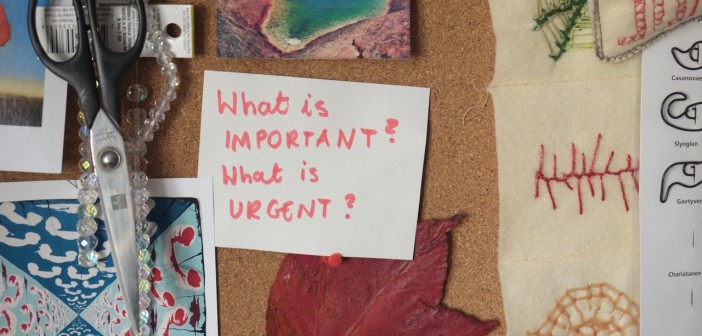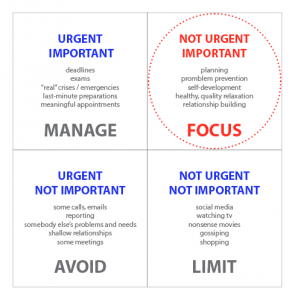Who does not struggle with time management and activities planning? Traditional agendas, notes stuck to the fridge doors, digital calendars, and mobile phone applications were designed to help us with managing the precious time we have. Dividing it consciously between studies, work, social or family life and leisure time is a challenge. Unfortunately, every day has only 24 hours, so being chaotic might generate a lot of unnecessary frustration. How to keep a balance between different areas of our daily lives? Try out the Covey’s Time Management Grid. It is a simple, yet powerful planning tool that can support you in self-development.
Text and pictures: Joanna Wróblewska
Stephen R. Covey was a famous leadership authority classified by TIMES magazine as one of the 25 most influential Americans. His books The 7 Habits of Highly Effective People (1989) and First Things First (1994) became international bestsellers. In his writings, Covey promoted an extremely interesting approach to time management that could be an answer to many of your struggles. Maybe a little bit of planning would bring you a relief and make you focus on things that are important? You will not know, if you do not try out this simple tool called the Covey’s Time Management Grid.
The Covey’s Time Management Grid (or Matrix) is divided into four equal areas that indicate diverse tasks that we have to or want to accomplish every day. Ordering them will help you to understand what are the priorities and what are the time killers. Many people find it hard, but consider that: in a moment you realize what your values and priorities are, you will start to make right choices according to your vocation, talents and skills. Consciousness will give you a freedom of choice.
1. Manage: Urgent and important
First area of the matrix is related to activities that are immediate and substantial. Those are deadlines, last minute preparations, exams, both medical and other “real” emergencies, crises, and meaningful appointments. These things have to be done as soon as possible, so do not wait for too long and just do them!
2. Focus: Not urgent, but important
Covey emphasizes this particular area especially. It is not urgent but seems to be the most important one. It is the space for self-development, strategic thinking and planning, problem prevention, preparations, opportunities searching and genuine relationship building. It is also a space for planning and experiencing a real relaxation that will feed your creativity. Do you have in mind any professional or personal development? Would you like to improve your leadership skills? Plan it and do it.
It maybe sounds odd, but for many people including me, it is hard to focus on themselves. To many of us, other people needs have bigger importance than our desires and plans. Do you remember the famous rule of the aircraft emergency? First put your vest, then assist the children. To be ready to help with pleasure and empathy, we should first take care of ourselves!
3. Avoid: Urgent, but not important
In many cases, we recognize activities as urgent and important, but as a matter of fact their importance is incredibly small. Reporting, answering calls and emails, solving somebody else’s problems and maintaining shallow relationships are the most popular interruptions. They take a lot of time and do not allow us to focus on the most important things. Avoiding them would save you a lot of frustration. Sometimes it seems to be not possible, but if you stay close to yourself, you will manage to get rid of them. Make small steps and slowly redirect your attention to the second field, the area of focus.
4. Limit: Neither urgent nor important
Okay, nobody is perfect. We all watch nonsense movies, read crappy books, follow news in social media or gossip from time to time. But what if all those activities take most of the precious time? Whenever you open the Facebook, Twitter or start watching a soap opera make a note. Do it for seven days and then double check how much time do you spend on time wasters. With a bit of effort, you should be able to replace them with healthy relaxation, comfortable and healing sleep, nutritious and food preparation. On top of that you will have much more time for doing things that you actually love!
Summarizing, the Covey’s Time Management Grid can impact your life in a very positive way. Stay open, observe yourself, make notes and check your routines. You are the king (or queen) of your time, and only you can make a decision to make it a quality time. Do not complain anymore and start to change the world for yourself!
Learn more:
Level 5 Time Management: Beyond Stephen R. Covey and Ben Franklin
Stephen R. Covey Gives You a 3rd Alternative
Stephen R. Covey, ‘7 Habits’ Author, Dies At 79



1 Comment
And i love your title “what’s urgent and what’s important”